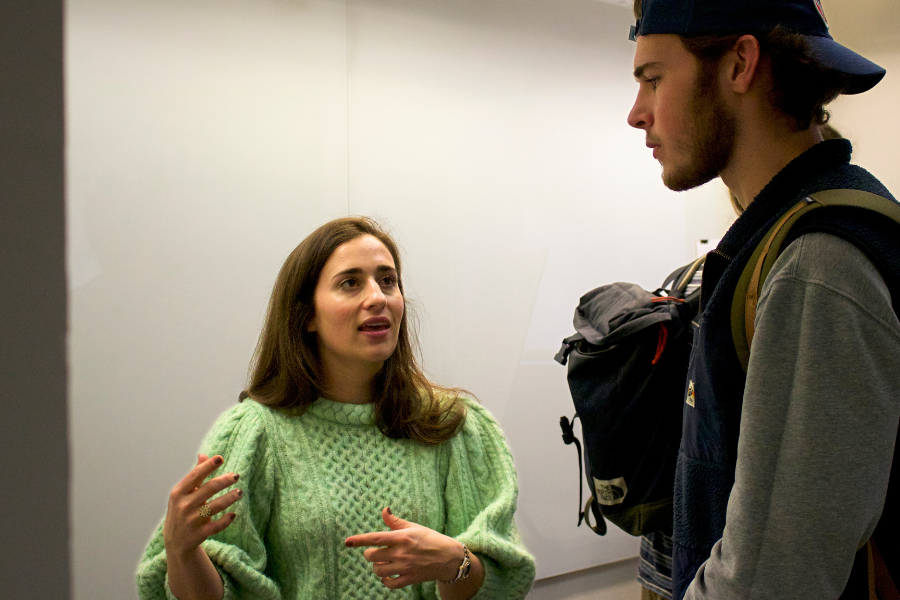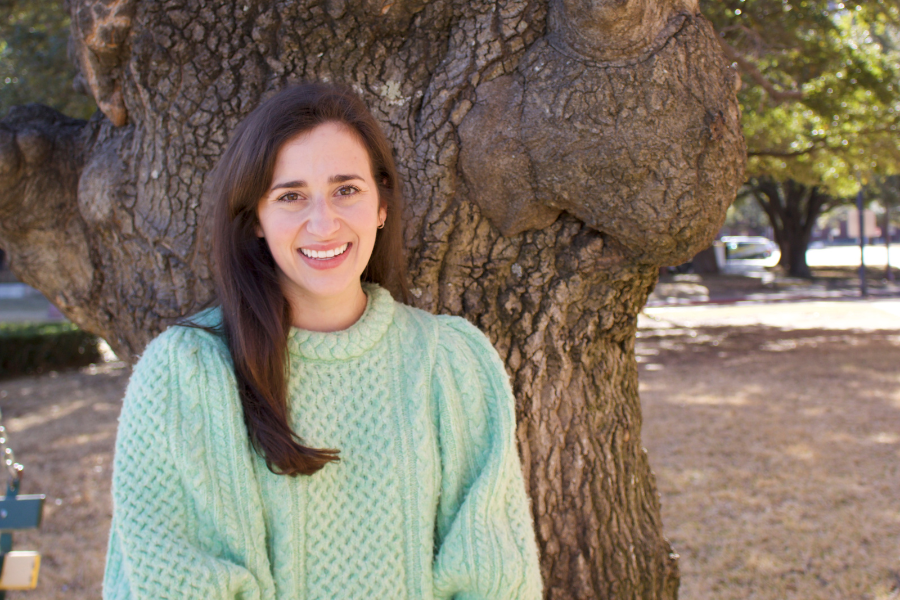Engineering Alumna Supports Students through Design Course, Career Day and Industry Partnership

Even when Madison Dillenberger, BSME ’19, faced obstacles during her undergraduate years, she loved how the small class sizes in Baylor’s School of Engineering and Computer Science allowed her to connect with her professors, facilitating an environment where professors could both attentive and encouraging.
Dillenberger conceded that even when it “felt like I was muscling through, there were classes that I really did love, and it made some semesters go really well academically.”
Two of the courses that were particularly enjoyable for Dillenberger were Junior and Senior Design. In the former, she was the project lead, supervising both the electrical and the mechanical leads to create a small-scale device. Challenges such as language barriers and shortcomings in her knowledge about electrical engineering forced Dillenberger, who was a mechanical engineering major, to simultaneously take charge and lean on the team – learning when to step up in her own strengths and when to lean on people with different strengths.
The next year, Dillenberger took that knowledge into Senior Design class, where she says she was fortunate to have a great team. This project was for First Baptist Church Woodway’s special needs classroom service: Helping Hands Ministry. Young people with special needs have a diverse range of needs to contend with, not to mention the fact that the ministry assists ages ranging from kindergarten to high school. Making a single project beneficial to all the students was no small task.
One student had a fascination with the fluidity of water to the point that the faucets in the room had to be shut off by maintenance, so a water feature was off the table. Another was stimulated by light, but they had to ensure that the lights were dimmable. Certain students responded to motions while others reacted well to sounds, yet these couldn’t be too loud. One student was prone to knocking things over, so the project had to be sturdy. It couldn’t have an external power source and needed to have at least a five-year warranty on all parts to make full use of the cost of the project, in addition to the parts being removable so that a feature could be replaced if necessary. Helping Hands Ministry had additional constraints of the director’s needs based on moveability, classroom space, and the religious nature of the program – making for an even more ambitious project.
The result was that the team designed and produced a six-feet tall, four-sided, collapsible sensory board with aspects geared toward every student. It was easily foldable and movable to ensure that senior volunteers in charge of the class could move it on their own, that it was able to fit through the door, and (after trial and error) had wheels that flipped away so it could lay flat on the ground for added stability. As a finishing touch, the team added felt boards that could be used for instruction and a space where the directors could place Bible verses or stories for the students.
These spaces helped provide the necessary tools needed to fulfill the ministry’s mission: “to provide instruction and social interaction to communicate God’s love and grace to individuals with special needs.” The ambition paid off, and years later, the ministry is still using the project.
The project’s sponsor at Helping Hands, Janice Stewart, explained how this project “was truly an answer from the Lord to take an idea that was small and turn it into something great.”
When Kelley Dillenberger, Madison’s father who is also an engineer, joked that “he was bound to get an engineer out of one of his kids,” citing Dillenberger as “his last chance,” he probably never knew the impact his daughter would have.
This connection between father and daughter influenced Madison to be even more grateful for her four years at Baylor because the Junior and Senior Design projects and teams encouraged the problem-solving part of Dillenberger’s personality, which was why she chose to become an engineer.
In addition to the relationships she made with her teammates, who years later still exchange life updates, the bonds she had with her professors allowed her experience to be joyful. She remembers all the way back to her Intro to Engineering class and noted that even the professors focused heavily on research “were still laser-focused teaching the material and on us learning it.”

The relationships made with professors in her undergraduate years didn’t stop at graduation. Professor Joseph Donndelinger, Clinical Professor of Professional Practice, guides Engineering Design I and II courses. He is a strong advocate for students attending Baylor Career Day, which is where Dillenberger managed to get her first job. The Baylor Career Center is hosting 120 companies on campus Sept. 20, 2023, and students can register here.
By keeping in contact with her former professor, Madison was able to come back to Career Day, this time on the other side of the table representing The Brandt Companies, where she works as assistant project manager.
“Baylor was some of the most formative time in my life, and I loved it,” Dillenberger says. “If I can hire Baylor people – I'm biased, but I think they're pretty great people, and it's a great place to source talent.”
Knowing how nerve-wracking Career Day can be for students, Dillenberger makes sure to encourage students, “I was in your shoes a couple years ago. I'll just tell you what I do, and then tell me about yourself. We'll see where the conversation goes from there.”
Project leadership and teamwork experience have helped Dillenberger be successful at Brandt while also passing on hope to current Baylor engineering students.
“I always appreciated the focus, dedication, and positive energy that Madison brought to design project teams,” Prof. Donndelinger says. “I am glad that others have recognized these qualities in Madison and have provided opportunities for her to flourish in engineering practice.”
ABOUT THE SCHOOL OF ENGINEERING AND COMPUTER SCIENCE AT BAYLOR UNIVERSITY
Baylor’s School of Engineering and Computer Science (ECS) has been preparing its students for more than 25 years as innovators for worldwide impact by training graduates for professional practice and responsible leadership with a Christian view. Students can choose from majors including bioinformatics, computer science, electrical and computer engineering, general engineering, and mechanical engineering. ECS also offers graduate programs in all areas of study within the School. We stand out from the crowd through Christian commitment, a strong community, expert accessibility, leading practical experience and teamwork. Visit the ECS website to learn more and follow on Facebook or Instagram.